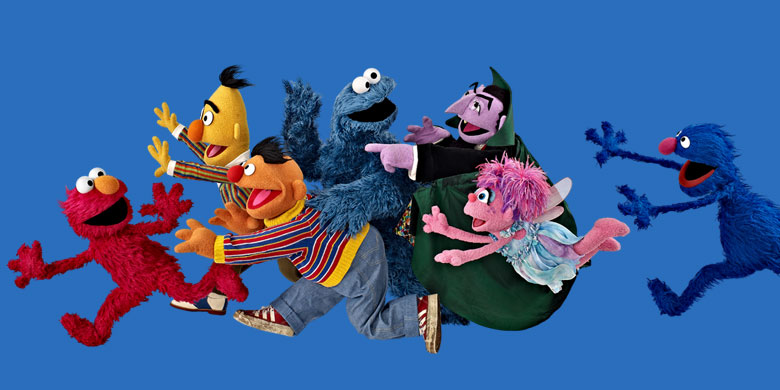In honor of Sesame Street‘s 45th season on public television, we invited Dr. Jennifer Kotler Clarke, Vice President, Research & Evaluation, Sesame Workshop, to author a guest blog, “Sesame Street Celebrates 45 Years,” with our community. We hope you’ll enjoy her expert insight on what goes into producing a new season of Sesame Street that addresses the changing needs of our nation’s early learners.
Are you interested in contributing to our blog? We’re looking for stories about your favorite public television and radio programs, stations, memories and more. Get in touch with your ideas at [email protected]. Thanks!
———————–
When Sesame Street started in 1969, it was built on the foundation that all children deserve to be prepared when they enter school and that by using media as a teaching tool we could help in leveling the playing field for low income children to their more affluent peers.
As we celebrate 45 years this fall, it is a milestone for Sesame Workshop as well as for every public broadcasting station that has brought Sesame Street’s colorful characters and engaging educational content to the screens of millions of families across the nation each day.
Each year Sesame Workshop reviews the state of children’s well-being to plan the curricula for the upcoming season. This year was no different. When we heard that data on children’s school readiness were to be released this past year from the Institute of Education Sciences, we were eager to work with Mathematica Policy Research to analyze the data to give us a snapshot of children’s readiness so we could plan the upcoming season.
What we found reinforces the growing challenges of today. According to the research, only about a third of children are in the process of understanding or actually skilled in the math and reading activities that support the kinds of lessons they will encounter in kindergarten. Only about a half of children consistently demonstrate the social-emotional/executive function skills that will best enable them to adapt and learn during kindergarten. In fact, over one-third of children begin kindergarten not proficient in even one of the domains surveyed. These children tended to have many risk factors and showed low ratings on most items in reading, math, approaches to learning and self-regulation/executive function behaviors. Although not addressed in the report, there are quite a number of research studies showing that high quality preschool education can make a difference in a child’s educational trajectory. There is also evidence that interventions in informal settings can be effective as well.
Using data from the Mathematica study and input from education experts, we set out to focus the new season’s curricula on specific skills that support school readiness and that can be taught through media. Our intent was not to reduce the importance of any one area of child development, but to become more deliberate about the skills within the broader categories that we needed to emphasize. Sesame Street has always addressed all aspects of child development to help children become smarter, stronger and kinder. In fact, there is much evidence that Sesame Street and other public television programs do positively impact children’s school readiness.
On September 15, children will get their first taste of what we know will be an epic 45th season on Sesame Street. And in our quest to give flexibility to busy families, for the first time a half-hour version of the show will air weekday afternoons and weekend mornings on PBS stations, complementing the one-hour series that airs weekday mornings. The new afternoon program will offer families even more access to the series introducing young viewers to a variety of school readiness skills – including impulse control and socio-emotional lessons – for which parents are increasingly seeking resources.
Furthermore, for the first time, select full episodes of the 30-minute show will be available for free online at PBS KIDS, on the PBS KIDS Video App and on the PBS KIDS Roku channel. These additional outlets can help reach even more children and give them the chance to have fun with their favorite furry friends and learn anytime, and almost anywhere.
Despite the fact that 44 percent of children arrive at school with one or more risk factors that put them at a disadvantage, we feel confident that those children who engage with quality educational experiences, including Sesame Street, before kindergarten will enter school smarter, stronger, kinder and ready to learn. Sesame Workshop is grateful to have a partner in public television as we work together to improve the lives of children nationwide.

Follow Us